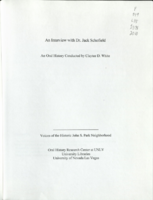Search the Special Collections and Archives Portal
Search Results

Transcript of interview with Bert Hood by Dennis McBride, June 16, 1998
Date
Archival Collection
Description
Bert Hood is celebrated in Las Vegas's gay history for his ownership of the Red Barn, one of our most famous gay bars. This is another of those serendipitous interviews I've conducted with someone I very much wanted to interview but didn't know how to find. Bert's in Las Vegas from Oklahoma City for just a short while visiting old friends, and I was lucky enough to have found him through Bill Schafer, president of the Southern Nevada Gay and Lesbian Historical Society. I want to thank you, Bert, for donating these two hours of your vacation time to me so I can preserve your stories for the gay community.
Text

Transcript of interview with Irwin Molasky by David G. Schwartz, April 23, 2014
Date
Archival Collection
Description
Interview with Irwin Molasky by David G. Schwartz, April 23, 2014. In this interview, Irwin Molasky discusses arriving in Las Vegas in the 1950s, and building the Pyramids motel on the Strip. He talks about the entertainers in various hotels on the Strip, the concept of the "star policy," and bringing Parisian shows to Las Vegas. He goes on to discuss his real estate developments, including Paradise Palms, Boulevard Mall, and Sunrise Hospital, and donating the land for the development of UNLV.
Irwin Molasky came to Las Vegas in 1951, during a time when "everyone knew everyone else," and there was a small, but strong Jewish community. An Army veteran, Irwin and his wife moved to Las Vegas after living in California for a short time. Irwin soon built The Pyramids, a Strip motel next to the Flamingo Hotel and Casino. The Pyramids opened the same day as its northern next-door neighbor, The Sands Hotel and Casino, on December 15, 1952. Irwin used his newly acquired contractor's license to become on the city's most important real estate developers. Over the next 60 years, he built everything from residential housing, including Paradise Palms to commercial properties. Projects included Sunrise Hospital and the surrounding medical buildings; Sunrise City Shopping Center and other power centers; Bank of America Plaza and much other downtown development; and golf courses. When the recession hit, Irwin began bidding on government projects across the country, successfully shielding his business and employees from the economic downturn. Irwin's real estate ventures not only had a tremendous impact on Las Vegas' economic development, but a substantial effect in social programming. Irwin donated 40 acres of prime real estate to the University of Nevada - Las Vegas (UNLV) so that university could expand. Additionally, he was the Founding Chairman of the UNLV Foundation and received an honorary doctorate in humanities.
Text

Transcript of interview with Irwin Kishner by Claytee D. White, September 10, 2013
Date
Archival Collection
Description
Irwin Kishner (1933 ? 2017) was a noted real estate developer, attorney and longtime community leader. In this oral history interview conducted in 2013, he briefly shares his childhood growing up Jewish in Brighton Beach area of Brooklyn, New York. He often speaks of himself in the third person, as he brings to life his roots, his family?s move to Miami where he graduated from high school and the tale of his relocation to Las Vegas to work with his uncles Herman and Maury Kishner. He describes his entrance to Las Vegas as that of a bon vivant. And truly, Irwin, fell in love with the city from the moment he arrived in 1960. Irwin was a graduate of University of Florida (1954) and University of Miami Law School (1958). Both his daughters, Sharon and Joanna, were born in Las Vegas and he reminisces about becoming a Jewish bachelor father to them. In June 2013, shortly before this interview, Irwin celebrated his 80th birthday. He was a proud father, grandfather and energetic businessman who left an indelible mark on everyone he knew. As a developer, he was known for the Somerset Apartments, Somerset House Motel, Somerset Gardens apartment complex, and the Somerset Shopping Center. He enjoyed reflecting on the many community organizations he dedicated himself to, from the Las Vegas Convention and Visitors Authority to Opportunity Village to the original Las Vegas Rotary Club to the Community Concert Association?and that?s just to mention a few.
Text

Transcript of interview with Judith L. Hamblin by Margaret Stambro, March 30, 1976
Date
Archival Collection
Description
On March 30, 1976, collector Margaret Stambro interviewed schoolteacher and registered medical stenographer, Judith L. Hamblin (born June 11, 1941 in Las Vegas, Nevada) in her home in Henderson, Nevada. This interview covers the history of Henderson, local schools and teachers, and Helldorado. Also during this interview, Mrs. Hamblin discusses her fondness for Lake Mead, the Basic Magnesium Plant, Nellis Air Force Base, and the early aboveground atomic blasts.
Text

Transcript of interview with Emma Ellsworth by Clark Ellsworth, March 5, 1980
Date
Archival Collection
Description
On March 5, 1980, Clark Ellsworth interviewed his grandmother, Emma Ellsworth (born 1902 in Payson, Utah) about her experiences in Southern Nevada. Ellsworth first talks about growing up in Utah and getting married before moving to Pioche, Nevada during the Great Depression. She also talks about bringing up a family in Las Vegas as well as her and her husband’s work in running Beneficial Life, a life insurance business, in Las Vegas. Ellsworth also talks about the Mormon churches in Las Vegas, the schools her children attended, and the number of grandchildren and great-grandchildren she had at the time.
Text

Transcript of interview with Dorothy Ross Fletcher by Sharon Hildebrandt, June 26, 1975
Date
Archival Collection
Description
On June 26, 1975, Sharon Hildebrandt interviewed Dorothy Ross Fletcher (born 1936 in Las Vegas, Nevada) about growing up in and living in Southern Nevada. Fletcher first talks about that various towns in which she lived while growing up before discussing the schools she attended. She also discusses the changes in schools, her involvement in politics, church activity, gambling as a recreational activity, and prominent visitors who came to Las Vegas. Fletcher also talks about living in Nevada during World War II, the atomic testing, environmental changes and extreme weather, and the social changes in Las Vegas. The latter part of the interview involves discussion of real estate, the introduction of air conditioning for cooling, changes on the Las Vegas Strip, recreational activities available to youth in Las Vegas and the increase in the nonnative population.
Text

Transcript of interview with Dr. Jack Lund Schofield by Suzanne Becker, January 13, 2009
Date
Archival Collection
Description
In the dusty border town of Douglas, Arizona, Dr. Jack Lund Schofield was born in the family home in 1923. Due to the economic woes of the Great Depression, the Schofield family moved several times until 1937—the year that Jack's father took a position as a tungsten broker and moved his family of five children to Nevada. For Jack, who was ready to start high school, the move from Phoenix to Las Vegas with a small population of 5000 was a shock. However, it did not take the gregarious Jack long to make friends at Las Vegas High School. He played sports and was a Golden Glove boxing champion. As Jack's high school years drew to an end, two major events occurred: he met his future wife and World War II began. He proudly highlights his service as a fighter pilot in both WWII and the Korea conflict, his family genealogy, and his devotion to being an excellent educator, businessman, family man, and politician. In 1995, he earned his doctorate in education at the age of 72. His resume includes being an elected official, serving on the Board of Regents and having a middle school named after him. Jack and his wife, Alene, have resided in the John S. Park Neighborhood for over 50 years and describes his affection for the neighborhood and some of the changes that have occurred.
Text

Transcript of interview with Ron Textor by Claytee White, July 24, 2007 & October 8, 2007
Date
Archival Collection
Description
Ron Textor grew up in Kirksvile, MO shortly after moved to Flint. MI; father was a doctor and mother a school teacher; started piano lessons at 5 and trombone at 8; attended classes at the Stan Kenton clinics at Michigan State University; National Stage Band Camp at Cleveland at the Western Reserve University; started own band at age 14 in Flint, MI; graduated high school in 1965; went to Central Michigan University graduated in 1969 with a bachelor's in music; 1972 released from the army and joined the Glenn Miller Orchestra under Buddy DeFranco; trumpet player Tom Snelson — Phantom of the Opera; The Airmen of Note; Colorado Springs Symphony Orchestra; recording at RCA Victor in Tokyo; 50 weeks a year of one-nighters; St Regis Roof in New York City; book by George Simon on Glenn Miller; Medina Ballroom; traveling by bus; rehearsal with Frank Sinatra; master's degree from Central Michigan; taught college at Michigan, Central, and Alma College; Mott Community College; moved to Wisconsin and taught at Mount Scenario College in the late 70 s; General Motors; Genesee County Fine Arts Council; CETA; Detroit Montreux Jazz Festival; 1981 Montreux Switzerland Jazz Festival; North Sea Jazz Festival at the Hague in Holland; move to Las Vegas 1981.
Text

Interview with Joyce Anne (Reese) Parkhurst, November 27, 2004
Date
Archival Collection
Description
Text

Interview with Nick C. Aquilina, June 25, 2004
Date
Archival Collection
Description
Text
